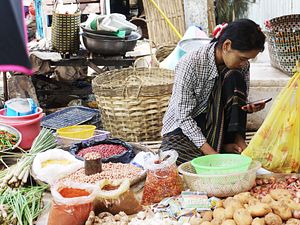In 2004, the same year Facebook was launched by Mark Zuckerberg and his college roommates, an 18-year-old in Yangon was hard at work on Myanmar’s first smartphone app. Their lives couldn’t have been more different. While Silicon Valley was already awash in cash and glamor, Myanmar’s military junta was restricting access to the web. All but a few pages were blocked.
Luckily for Htoo Myint Naung, that didn’t include the developers’ section of Microsoft’s website. He used his father’s sluggish dial-up connection to load the pages and, eventually, MySM, or My Short Message, which allowed users to text in Burmese, was born. More than four thousand people downloaded it — a vast portion of the people who owned a smartphone at the time, he said.
Since then, Htoo Myint Naung and the company he subsequently founded, Technomation, have been behind the creation of scores of apps. They are among dozens of developers working to meet an accelerating demand for content in a country whose 51.4 million citizens, left behind by the global tech revolution, are finally coming online, most of them through cell phones.
Until late last year, when international telecommunications firms Telenor and Ooredoo entered the market, SIM cards were prohibitively expensive, costing hundreds of dollars. Now they can be bought for less than $2. Cheap Android smartphones have flooded the market and data from last year’s census showed that more people own cell phones than have electricity at home.
Among the most popular new apps are games with a local spin — one features a goofy childhood cartoon character — as well as news aggregation services and messaging services. There’s even an anonymous social network like Yik Yak. While many companies in the developed world are still striving to go mobile-first, some predict Myanmar will skip the desktop generation entirely.
“Nobody has to tell Myanmar developers to build for mobile-first — they just know,” David Madden, an Australian tech entrepreneur based in Yangon, said in a recent interview. Last year he opened Phandeeyar, an ‘innovation hub’ that fosters tech start ups in the country. It’s also a space for the young developers who hang out there to come up with solutions to the myriad problems that plague the sector.
Thiha Aye Kyaw was just 17 when he developed Frozen Keyboard, a sort of QWERTY keyboard for Myanmar. Back then, the Google Play store, the app shop for Android devices, was blocked in the country so he had to post the keyboard on a blog for IT professionals. After that, phone shops began installing it.
“Distribution has been a challenge over the years,” said Madden with a weary laugh.
Due to remaining international sanctions, Google still stops locals from downloading paid Myanmar apps from its store, which is also incompatible with many of the Chinese smartphone models that wind up in the country. On top of that, most people in the country are still unbanked, meaning they do not have bank accounts.
Developers have employed a number of hacks to get around the problem, including selling USB sticks with the app installed and collaboration with telcos, though the latter has led to the big firms taking most of the revenues.
MYSQUAR, an entertainment platform for Myanmar set to list on London’s AIM stock exchange later this year, sent a team of students to convince phone shops to install their free local-language messaging service, MyChat. “It’s somewhat of a Myanmar-centric solution,” said Daniel Campbell, the firm’s general manager.
Even when developers do manage to distribute their product, there’s the threat of rampant piracy. “Everything in our country is limiting our creativity,” said Htoo Myint Naung.
But he’s made a career out of coming up with solutions. “Engineering has always been my hobby, but the real thing that triggers me is the problems,” he said. “Right now, I see youngsters who graduate from university who want to make an awesome app but there is no way of getting money from the customers because there is this bank infrastructure gap.”
He’s about to launch an app store for Myanmar that he hopes will help young developers monetize their inventions, by allowing users to pay for them with scratch-cards. Technomation will take a 30 percent cut.
Htoo Myint Naung’s not betting that everyone will be ready but, typically ahead of the game, he’s going to do it anyway. “I’m not sure whether the developers will be ready – but I will launch, whether they are ready or not.”

































